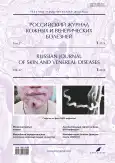Resistin in patients with psoriasis vulgaris during PUVA therapy
- Authors: Yatskova O.S.1, Teplyakova K.S.2, Pritulo O.A.3
-
Affiliations:
- Central polyclinic
- The First Sechenov Moscow State Medical University (Sechenov University)
- Medical Academy named after S.I. Geargievsky of the V.I. Vernadsky Crimean Federal University
- Issue: Vol 27, No 1 (2024)
- Pages: 83-90
- Section: DERMATOLOGY
- URL: https://journals.rcsi.science/1560-9588/article/view/252891
- DOI: https://doi.org/10.17816/dv624667
- ID: 252891
Cite item
Abstract
BACKGROUND: Currently, psoriasis represents a serious medical and social problem, and it is one of the most common chronic skin diseases. Over the past decades, special attention has been paid to the association of psoriasis with various diseases, such as cardiovascular diseases, inflammatory bowel diseases, depression, etc. Common comorbidities of psoriasis include metabolic syndrome or obesity. Resistin is one of the hormones produced by adipose tissue, the concentration of which increases markedly in patients with psoriasis. Resistin expression is induced by proinflammatory cytokines such as IL-1, IL-6, IL-12 and TNF-a. In turn, an increase in resistin levels leads to increased production of pro-inflammatory cytokines involved in the development of psoriasis, thereby promoting the recruitment of leukocytes during the inflammatory process leading to chronic inflammation. Taken together, the above changes may contribute to the development of metabolic syndrome in psoriasis. Among the effective methods of treating the disease, phototherapy methods (PUVA and UVB 311 nm) remain relevant. Considering these data, it is of interest to study the level of resistin in the serum of patients with psoriasis and its change after a course of PUVA.
AIM: The aim of our study was to evaluate the serum resistin level in patients with psoriasis vulgaris before and after PUVA.
MATERIALS AND METHODS: The study was conducted at the department of Skin and Venereology diseases at the Sechenov University in the period from June 2022 to November 2023. The study included 30 patients with psoriasis vulgaris of moderate severity (PASI <20), of whom there were 16 men and 14 women. The healthy control group included 20 participants (11 men and 9 women). All patients had blood drawn from a vein during hospitalization and after a course of PUVA. Healthy participants underwent a single blood draw from a vein.
RESULTS: A noticeable decrease in the level of resistin in the blood serum was revealed after a course of PUVA in all patients with psoriasis compared to baseline values. In addition, after treatment, resistin levels approached the values recorded in healthy participants.
CONCLUSION: Thus, our study allows us to consider resistin as a biological marker of the effectiveness of PUVA in the treatment of patients with psoriasis vulgaris, as well as a predictor of the occurrence of concomitant diseases in patients with psoriasis.
Full Text
##article.viewOnOriginalSite##About the authors
Olga S. Yatskova
Central polyclinic
Email: olesha230808@mail.ru
ORCID iD: 0000-0002-9644-4778
SPIN-code: 9548-9076
MD, Cand. Sci. (Med.)
Russian Federation, MoscowKseniya S. Teplyakova
The First Sechenov Moscow State Medical University (Sechenov University)
Author for correspondence.
Email: hvpvea@gmail.com
ORCID iD: 0000-0002-0428-5627
SPIN-code: 5983-9344
Russian Federation, 4/1 Bolshaya Pirogovskaya street, 119991 Moscow
Olga A. Pritulo
Medical Academy named after S.I. Geargievsky of the V.I. Vernadsky Crimean Federal University
Email: 55550256@mail.ru
ORCID iD: 0000-0001-6515-1924
SPIN-code: 2988-8463
MD, Dr. Sci. (Med.), Professor
Russian Federation, SimferopolReferences
- Rendon A, Schäkel K. Psoriasis pathogenesis and treatment. Int J Mol Sci. 2019;20(6):1475. EDN: QBZVOI doi: 10.3390/ijms20061475
- Tokuyama M, Mabuchi T. New treatment addressing the pathogenesis of psoriasis. Int J Mol Sci. 2020;21(20):7488. EDN: NQVOCH doi: 10.3390/ijms21207488
- Clinical Recommendations RF 2023 (Russia). All-Russian Public Organisation of Dermatovenerologists and Cosmetologists; 2023. (In Russ). Available from: https://diseases.medelement.com/disease/псориаз-кр-рф-2023/17540?ysclid=lrz51fhbza753776898. Accessed: 15.01.2024.
- Griffiths CE, Armstrong AW, Gudjonsson JE, Barker JN. Psoriasis. Lancet. 2021;397(10281):1301-1315. doi: 10.1016/S0140-6736(20)32549-6
- Gordon KB. Translating the science of psoriasis. Semin Cutan Med Surg. 2016;35(4 Suppl 4):S64. doi: 10.12788/j.sder.2016.017
- Gisondi P, Fostini AC, Fossà I, et al. Psoriasis and the metabolic syndrome. Clin Dermatol. 2018;36(1):21-28. EDN: YFERZR doi: 10.1016/j.clindermatol.2017.09.005
- Rodríguez-Zúñiga MJ, García-Perdomo HA. Systematic review and meta-analysis of the association between psoriasis and metabolic syndrome. J Am Acad Dermatol. 2017;77(4):657-666. doi: 10.1016/j.jaad.2017.04.1133
- Steppan CM, Bailey ST, Bhat S, et al. The hormone resistin links obesity to diabetes. Nature. 2001;409(6818):307-312. doi: 10.1038/35053000
- Huang H, Shen E, Tang S, et al. Increased serum resistin levels correlate with psoriasis: a meta-analysis. Lipids Health Dis. 2015;14:44. EDN: IXYJUY doi: 10.1186/s12944-015-0039-9
- Hsu WY, Chao YW, Tsai YL, et al. Resistin induces monocyte-endothelial cell adhesion by increasing ICAM-1 and VCAM-1 expression in endothelial cells via p38MAPK-dependent pathway. J Cell Physiol. 2011;226(8):2181-2188. doi: 10.1002/jcp.22555
- Johansson L, Linner A, Sunden-Cullberg J, et al. Neutrophil-derived hyperresistinemia in severe acute streptococcal infections. J Immunol. 2009;183:4047-4054.
- Versini M, Jeandel PY, Rosenthal E, et al. Obesity in autoimmune diseases: Not a passive bystander. Autoimmun Rev. 2014;13(9):981-1000. doi: 10.1016/j.autrev.2014.07.001
- Kungurov NV, Filimonkova NN, Topychkanova EP. Systemic inflammatory response and the dyslipidemia in psoriasis. The Fundamental researches. 2013;(9-1):188-194. EDN: QZMQKZ
- Jensen P, Skov L. Psoriasis and obesity. Dermatology. 2016;232(6):633-639. doi: 10.1159/000455840
- Khobeysh M, Sysoev KA, Sokolovskiy EV, Lapin SV. The role of adipokines and cytokines in the pathogenesis of psoriasis in patients with concomitant metabolic disorders. Kremlin Medicine Journal. 2018;(1):26-35. EDN: YQXTSU
- Olisova OY, Teplyuk NP, Pinegin VB. Modern methods of psoriasis treatment. Russkii meditsinskii zhurnal. 2015;23(9):483-484. (In Russ). EDN: UBLUPR
- Kawashima K, Torii K, Furuhashi T, et al. Phototherapy reduces serum resistin levels in psoriasis patients. Photodermatol Photoimmunol Photomed. 2011;27(3):152-155. doi: 10.1111/j.1600-0781.2011.00575.x
- Seth D, Ehlert AN, Golden JB, et al. Interaction of resistin and systolic blood pressure in psoriasis severity. J Invest Dermatol. 2020;140(6):1279-1282.e1. doi: 10.1016/j.jid.2019.07.727
- Zhu KJ, Shi G, Zhang C, et al. Adiponectin levels in patients with psoriasis: A meta-analysis. J Dermatol. 2013;40:438-442. doi: 10.1111/1346-8138.1212
- Zhu KJ, Zhang C, Li M, et al. Leptin levels in patients with psoriasis: a meta-analysis. Clin Exp Dermatol. 2013;38(5):478-483. doi: 10.1111/ced.12171
Supplementary files










